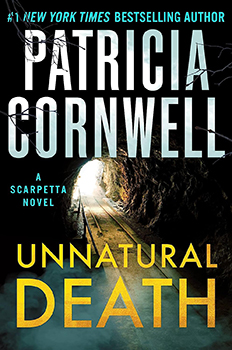Patricia Cornwell: A Profile
The Big Thrill Interviews Bestselling Author Patricia Cornwell
Patricia Cornwell—who, as the author of 40 books that have sold more than 120 million copies around the world, has left her own indelible mark—offers that disclaimer without hesitation. If it seems like an odd admission, it’s not.
As her newest novel, UNNATURAL DEATH, opens, Dr. Kay Scarpetta—Chief Medical Examiner of the Commonwealth of Virginia—is summoned to a baffling and barbaric crime scene. In the desolate woods, two bodies have been discovered, their remains desecrated beyond comprehension. And, inexplicably, a larger-than-life footprint has also been found nearby. What to make of that?
“I’ve always had to know for a fact that something is true if I’m going to write about it,” says Cornwell. “And then I get faced with the whole subject of Bigfoot, and I’m thinking: Well, I kind of want to address this… Fake or not, what would Scarpetta do if a footprint like this were discovered at the scene of brutal killings?”
Exploring the speculative nature of that question allowed the author to break loose from the self-professed “rigidity” of her writing process while still maintaining the tenets of truth and timeliness.

© Patrick Ecclesine
“Scarpetta and her crew all live in the world that you and I do,” Cornwell says. “So they’re watching the same things on the news.”
When she was penning UNNATURAL DEATH, media coverage was dominated by stories of civil unrest in the United States, the Russian invasion of Ukraine, and Putin’s secret army—all of which ran both counter to and parallel with the “primitive” and “absolutely fascinating” (yet utterly divisive) notion of Bigfoot.
“People who believe in it and swear to it are often made to feel stupid and ignorant,” Cornwell observes—a phenomenon she explores in the book through Scarpetta’s longtime friend and investigator (and Bigfoot believer) Pete Marino. Citing a similar single-mindedness among those who propagate division and strife in real life, she offers, “My point is: Don’t be so quick to judge.”
And while such hasty judgments are easy to disavow, prejudice and impulsivity aren’t so readily dismissed—making Scarpetta’s job subject to intense scrutiny and intrusion. Such volatility is compounded in UNNATURAL DEATH by the fact that the victims are internationally connected off-the-gridders who were wanted by the FBI.
“Medical Examiners have a really tough challenge,” Cornwell—who once worked in the Virginia ME’s office, where Dr. Marcella Farinelli Fierro would become the inspiration for Kay Scarpetta—asserts. Obstacles range from politics, pressures, and public (mis)perceptions to more pragmatic concerns such as inadequate funding and short staffing. “These folks are at the mercy of the powers that oversee them… At the end of the day, Scarpetta answers to the governor of Virginia, who appointed her and can also get rid of her.”
But the threats can also be of a more intimate nature, as evidenced by the opposition Scarpetta faces within her own office, where secrets, speculation, and suspicion often undermine loyalties.
“Even if you think you know those around you, you don’t know who they know, and you don’t know who they’re talking to,” the author says. “At the end of the day, the weak link is usually somebody right under your nose…who may not be the one who does it but is the one who causes it because of something that they said to somebody else or something they made available.”
Equally dangerous, however, can be the words that go unspoken—a sometimes unfortunate necessity of the work, and one that also applies to Scarpetta’s husband, Benton Wesley, and her tech-savvy niece (and quasi-daughter), Lucy Farinelli.
“Scarpetta often says that she and Benton have had more non-communication than any other happily married couple she’s ever known,” Cornwell says. “If you want a real, open, total transparency relationship, maybe don’t be married to a spy.…”
And Benton—once a profiler for the FBI but now chief threat assessor for the Secret Service—is “basically a spy,” as is Lucy. Consequently, the two are privy to sensitive information they can’t always share with Scarpetta, no matter how pertinent.

“There’s a reason Secret is in the name [of the agency],” the author quips. “There are many things that, whether they have to do with the intelligence community or ongoing investigations that could impact the presidency, the White House, cannot be said.”
Just such “need-to-know” information lies at the heart of UNNATURAL DEATH. And while Scarpetta is “a pretty good sport” about it (or at least more so than Marino), she’s none too pleased with the implications once she does learn the sinister truth that Benton and Lucy have been reluctantly withholding.
“It’s kind of her worst nightmare,” Cornwell acknowledges. “We have a revelation of a clear and present danger that maybe we didn’t think was going to be one anymore…but some things just keep washing up on shore.”
The reveal is of such a shocking nature that Cornwell—who rebooted the saga with 2021’s Autopsy, unburdening it from lingering backstory—didn’t see it coming herself, proving that the best way to surprise your readers may just be to surprise yourself.
“I wasn’t expecting that twist when I started the book. I didn’t know that was going to happen. Just so you know, I didn’t have any idea,” she confesses. “And then I went, ‘Oh, I think I know something…’”
That something is a potent reminder that the past is seldom at rest.
And while Scarpetta is rocked to her core by this disclosure, she also takes solace in restorative time spent with family, friends, and food—which have always provided a counterbalance to the morbidity of her job.
“It’s very important that you have these moments,” Cornwell says. “The readers have always been insistent that Scarpetta has to cook. And it’s not just because she’s a wonderful cook, but because they want to imagine at the end of this horrible day…that everything is well appointed and well taken care of. Because she takes care of everything. That’s what she does.”
Returning to her beautiful Old Town, Alexandria home—complete with a driveway of old pavers, verdant garden, and impressively stocked wine cellar—after the emotional and physical upheaval of a hazardous crime scene (which required her to be submerged in a polluted pond and to propel down a murky mineshaft) provides Scarpetta a literal and figurative cleansing.
It’s an experience that she shares with the reader, albeit vicariously. As Cornwell observes, “They, too, would like to get back to a nice, clean, well-lighted place and have a glass of wine and something good to eat and get away from all the darkness.”
Indeed, this melding of compelling crimes, complex characters, and creature comforts has led many longtime readers to rank UNNATURAL DEATH—the series’ 27th entry since the 1990’s sleeper hit Postmortem—among their very favorites.
“I’ve even had a few people who think this is the best Scarpetta they’ve ever read,” Cornwell marvels, noting that the story also left her feeling “like it lifted to a new level of drama and excitement.”
And while the book’s critical and commercial success—it was named an Amazon Editor’s Pick and debuted at number three on the New York Times bestsellers list (Combined Print & E-Book Fiction)—has been gratifying, it’s also brought about the nagging weight of expectations.
“Now, I’ve raised my own bar,” Cornwell reflects. “And so, as I work on the new one, I’m like, ‘Oh boy, you’ve got to make sure you do something magical in this one, too…’”
Which just goes to show that, sometimes, the biggest shoes we have to fill are our own.
Bigfoot would probably understand.
The Big Thrill Interviews Bestselling Author Patricia Cornwell
- Trial by Ambush - December 16, 2024
- Africa Scene:
Iris Mwanza
by Michael Sears - December 16, 2024 - Elle Marr - August 1, 2024

